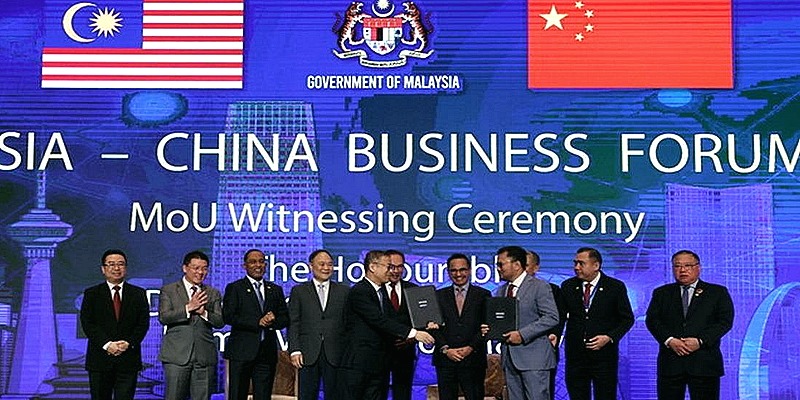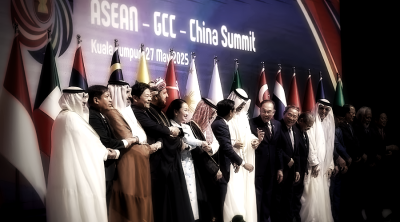
China’s commitment to invest a record RM170 billion in Malaysia is set to provide a massive boost to our economy for years to come.
The investment follows 19 memorandums of understanding signed between businesses in China and Malaysia, including in infrastructure, renewable energy, telecommunications and tourism.
These MoUs with Chinese companies represent the largest single investment commitment between Malaysia and China to date.
According to data from Malaysian Investment Development Authority (MIDA), China has been one of the largest foreign investors in Malaysia for several years, with significant investments in various sectors such as manufacturing, real estate, construction and energy.
In 2018, China was the top foreign investor in Malaysia with a total investment of US$2.2 billion.
The investment from China has the potential to create new jobs, increase foreign direct investment and upgrade the country’s infrastructure.
The money will be invested over the next five years, and will focus primarily on Malaysia’s infrastructure, digital economy and tourism sectors with RM30 billion set aside for the China Communications Construction Company to upgrade Malaysia’s rail network.
The benefit of this investment is that it provides Malaysia with the funding needed to improve its transportation infrastructure, including railways and ports which will facilitate the movement of goods, people and services.
If the RM 170 billion agreement materializes, the positive impact on our gross domestic product (GDP) is massive, with approximately 11.2% of 2022 GDP.
At the same time, the high correlation between foreign direct investment (FDI) and GDP growth at 0.95 indicates that the potential FDI could fuel our GDP growth moving onwards.
While Malaysia’s GDP growth for 2023 is predicted to decelerate to 4.0% based on consensus, this still outperforms the possibility of recession in the US and Europe, as the market anticipates that the US interest rate hike direction will be reset by the end of 2023 or beginning of 2024.
In addition to strengthening bilateral relations, China’s investment in Malaysia aligns with our country’s ongoing efforts to diversify our economy and reduce reliance on traditional sectors like manufacturing and agriculture.
By investing in renewable energy and technology, Malaysia moves closer towards a knowledge-based economy, which relies on the development of human capital, innovation and high-tech industries.
Although there are few MOU details disclosed by the government, the prime minister has hinted in parliament that some of the manufacturers and export players will potentially benefit from the incoming FDI, namely those from automobile and petrochemical sectors.
The world’s largest petrochemical company Rongsheng Petrochemical Co Ltd and well-known automaker Geely Auto are the pioneers to step in, with investment project values of approximately RM80 billion and RM 32 billion, respectively.
The investment also brings with it significant opportunities for Malaysian businesses to expand their exports and reach new markets in China and Southeast Asia.
China’s commitment to invest a record RM170 billion in Malaysia is set to provide a massive boost to our economy for years to come.
The agreement could strengthen Malaysia’s trade ties with China and provide a boost to small and medium-sized enterprises in the country.
Moreover, China’s investment is expected to attract more foreign direct investment (FDI) into Malaysia.
New infrastructure projects, including the expansion of ports, airports and highways are expected to attract businesses from across Asia and beyond.
By providing the infrastructure needed to support these businesses, Malaysia could become a hub for international investment in the region.
While China’s investment provides many opportunities for Malaysia, there are some challenges and risks that the country must consider.
One potential risk is that Malaysia may become too reliant on China, which could lead to political and economic consequences.
Additionally, some critics have raised concerns about the involvement of Chinese companies in the country’s infrastructure, citing the possibility of corruption, environmental concerns and improper tender processes.
Malaysia must also ensure that the investment does not lead to a rise in inflation, which could damage the country’s economic growth, or that the investments execute properly due to the potential challenges.
Despite these challenges, Malaysia can benefit from this investment if it puts in place adequate measures to deal with any associated risks.
To take full advantage of China’s investment, Malaysian policymakers should proactively focus on improving the country’s investment climate, promoting innovation and enhancing human capital.
This includes developing regulatory frameworks that promote transparency and accountability, improving infrastructure and attracting high-quality talent.
By doing so, Malaysia can create a sustainable and diversified economy that is equipped to withstand the challenges of a rapidly changing global economy.
Moreover, Malaysian businesses should do more to leverage the opportunities provided by China’s investment.
By focusing on exporting high-value products that cater to China’s growing middle class, Malaysian companies can develop new partnerships and increase their presence in the Chinese market.
China’s investment in Malaysia could be a game-changer for the country’s economy. The RM170 billion pledged investment in Malaysia over the next five years has the potential to help Malaysia become a regional player in innovation, infrastructure and tourism.
China’s investment will also provide an opportunity for Malaysia to reduce its reliance on traditional sectors while encouraging the development of new areas of the economy.

(Dr. Uma Murthy is a lecturer at the School of Accounting and Finance at Taylor’s Business School, Faculty of Business and Law, Taylor’s University.)
ADVERTISEMENT
ADVERTISEMENT








































